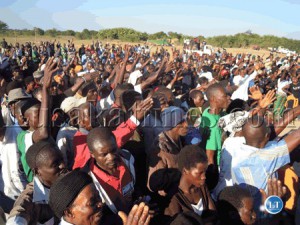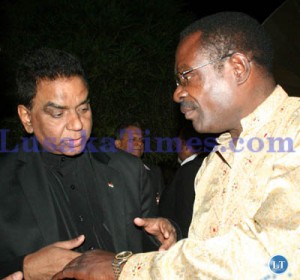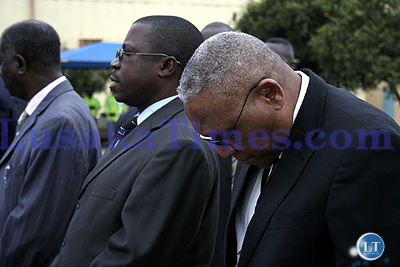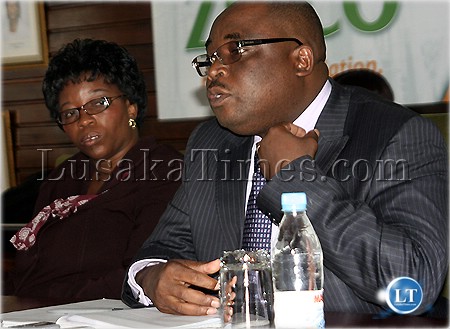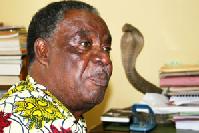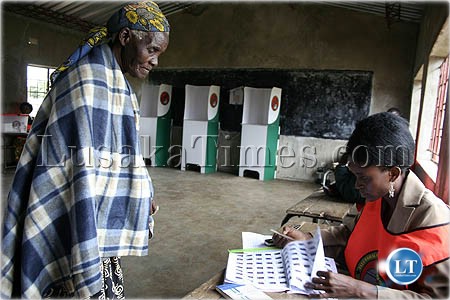
By Anthony Kasonde
Zambia’s Republican President, Rupiah Banda, a few days ago proudly informed the US Secretary of State, Hilary Clinton, that the only topic Zambians are discussing at the moment is the 2011 Presidential and Parliamentary Elections. However, Mr Banda just came short of announcing the elections date and only informed Mrs Clinton that elections will be held within a few months’ time.
Zambians would have been proud that the State President was indeed very much in touch with them that he even knew what they regularly discussed in their daily lives. Alas, Mr Banda would be disappointed to note that the only topic on the Zambian street is how they would get money in their pockets. If there is a semblance of the 2011 elections being discussed on the street, it is when exactly will the elections be held?
Elections Date in Other Countries
Zambia’s Presidential system of governance is based in large part on the US model but unlike in the US where Federal Law clearly stipulates that Presidential elections must be held on the first Tuesday of November every 4 years, the Zambian law does not specify which day or month elections are supposed to be held. Thus, even though we are entering into the middle of the year, Zambians are still not aware when exactly elections will be held and yet immediately after voting Barack Obama into office on 4th November 2008, the Americans knew that the next Presidential elections will be on 6th November 2012.
Zambia has also borrowed from the British system of governance but unlike the US system the British style of governance is largely based on Convention rather than written law. Under the current British system, even though the maximum term of parliament is 5 years, the Prime Minister can call elections at any time of his liking but before the end of the 5 years. It is thus possible that Zambian law is silent on the exact election date since it envisaged scenario where the politicians and the general citizenry would develop a system that would be developed, respected and observed over time.
The system of governance by Convention is very much suitable for mature democracies but also entails faith in the system and in people who participate in the system. That said, it is prudent to note that the British system have doubted their own system due to recent Politicians’ tendency to use the system when it suited their own political careers. Thus, there is currently a bill before the British Parliament which seeks to enact a fixed 5 year parliament with elections to be held on the first Thursday of May. Therefore if, as expected, this law is enacted the next general election in the UK will be on 7th May 2015.
What is the Fuss with the Elections Date?
It is thus clear that the very models where Zambia has based its system of governance have recognised that governments should be based on laws rather than men. When you put faith in men rather than in laws, you only have yourself to blame if the people turn out not what you expected them to be. In Zambia, the politicians seem to deliberately leave gaps in various legislations rather than enact them fully to stand the test of time.
This issue of the election date is the case in point. There has been speculation about when the elections will be held and at one time President Banda had to refute reports attributed to the Patriotic Front President Michael Sata that elections were to be held on 1st April 2011. The denial by President Banda was obviously credible since the month of April has long passed.
However, the inability to tell the Zambian people when exactly elections will be held has led to people suspecting that the current government is looking at ways of manipulating the system.
It is of course true that previous Presidents have called elections date at their discretion and hence supporters of President Banda would want him to be given all the time that he needs before he announces the election date. This statement appears to be true but is it right? Just because others have done it does not make it right.
Zambia has a wet season from about early November when roads particularly in rural areas which are already bad become impassable. Therefore, taking into account the logistics and common sense there is only 4 months left before elections can be conducted in a decent and reasonable manner. It is inconceivable that a country can talk about having free and fair elections when the electorate are not even aware when the elections will be held. Free and fair elections refer not only to things that happen on the polling day but are about a process leading to and including that day.
The essence of letting the electorate know well in advance when the elections will be, as in the American system, is not just good practice but it also helps in planning. At the moment, the only people aware of when the elections will be are the President himself and perhaps his family and his senior party members. However it is not just these people who need to plan and exercise their franchise. People will be interested in going away on holidays; business trips etc. but if they had the election date in mind then they would most definitely work around with this date in mind.
The students also stand to be disenfranchised if the election date goes the other way. It is not uncommon for students at university to be registered to vote during university time but when the election date comes around these students will be on vacation and back to their homes, or vice versa. However, if the election date is announced well in time then these students and other stakeholders will make proper plans to ensure that they do vote.
What does the Law in Zambia Say?
The law in black and white helps resolve a lot of things and not only removes ambiguity but helps prevent misguided leaders from developing into despots. When the law is there and complete there is no room for political manipulation. Zambia for example did so much better in 2008 after the death of President Mwanawasa because the Constitution provided that after the death of a President; elections must be held within 90 days. In this way, the government and other politicians could not manipulate the system because a specific law covering this area was already there.
However, if the period of holding elections were not stated it is possible that other factors not least the lack of money would have come into play and elections would have been delayed may be to this day.
There have been debates recently as to who is empowered to announce the election date, in Zambia. This again is brought about due to gaps in the legislation. Article 88 of the Constitution gives the President the power to dissolve parliament and then goes on to state that on dissolution of parliament, presidential and parliamentary elections must be held and the first session of the new parliament must be had within 3 months of the dissolution.
This is what appears to confuse people into thinking it is the President who is empowered to announce the election date. However the law does not support this view, in fact Section 17(2)(ff) of the Electoral Act 2006 as amended provides that the Commission may make regulations providing for, among other things, the fixing of a date of an election of a President or an election following the dissolution of the National Assembly.
It is thus clear that it is not the President who has to choose the date but the Electoral Commission. It should follow that whoever chooses the date must also announce it but this is usurped by the President and therefore appears to be the person that chooses the date. However what is clear is that the President merely sets the process in motion and the law seems to state that until parliament is dissolved (by the President) the Commission cannot fix the date – even if the tenure of parliament has come to an end. It is these gaps and loopholes that causes confusion and may create tension when the Electoral Commission decides to flex its muscle.
Therefore given the situation that only the President is given powers to dissolve parliament and the Electoral Commission cannot fix the date until parliament is dissolved, what rights do the people have if for example President Banda decided not to dissolve parliament? A lot of people would insist that cannot happen while others will say the country will demonstrate and demand that he does so.
The President will indeed be breaching the Constitution that only allows the life of parliament to be limited to 5 years unless of course extended due to an emergency e.g. due to an act of war. But seeing that there is no real emergency in the country, the powers that be must surely put the process into action now. This is because if, as everyone has accepted, President Band is merely finishing Late Mwanawasa’s mandate then he does not have long to do so. President Mwanawasa was elected on 28th September 2006 and therefore the life of that parliament is not required to go beyond September 2011.
In effect, the general elections in Zambia must be held at least soon after that date but parliament cannot go beyond that time. Thus even though elections are so near the government by their lack of communication is making them look so far.


